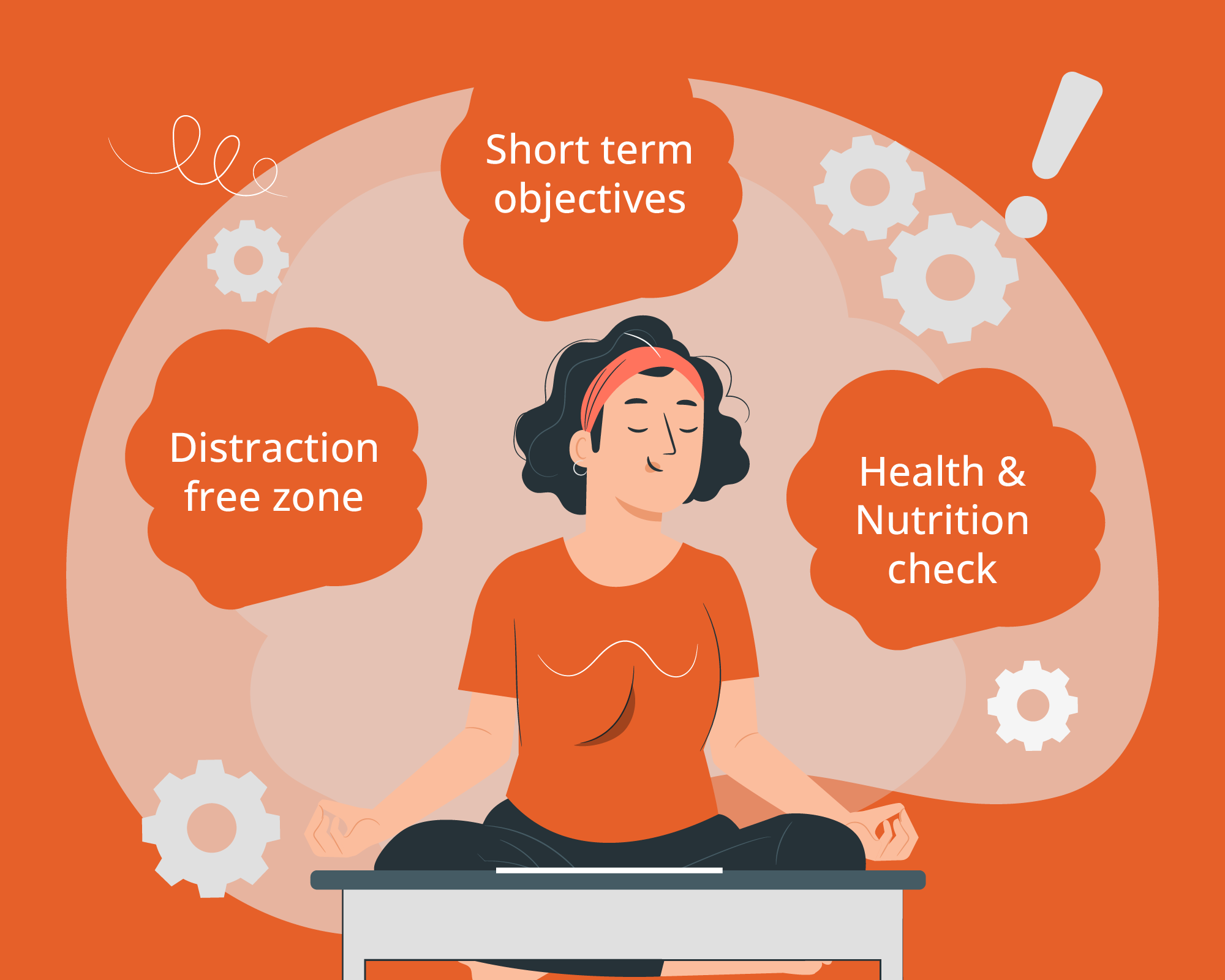How to Create a Study Timetable That Actually Works for Final Exams?

A study schedule is a simple plan that helps you manage your time so you can stay on top of your learning. Just like you set time for school, hobbies, or hanging out with friends, setting aside time for studying makes it easier to keep up with lessons and complete assignments without feeling overwhelmed.
When you follow a study schedule, big tasks feel less stressful because you’re breaking them into smaller, more manageable parts. This also helps you stay prepared for tests and exams instead of rushing at the last minute.
Want to create a study plan that works for you? Let’s go over how to do it and why it can make a big difference in your learning.
Why Having a Study Plan for Final Exams is Important?
Preparing for final exams can feel overwhelming, but having a study plan makes a major difference. Instead of feeling lost about where to start, a plan gives you a clear direction. It helps you stay organised, manage your time well, and avoid last-minute stress.
A study plan ensures that you cover all topics without rushing. When you plan your study time, you can focus on each subject properly instead of trying to cram everything in a short period. This way, you get enough time to understand concepts instead of just memorising them.
It also helps you stay consistent. Studying a little every day is more helpful than trying to learn everything at once. When you follow a schedule, your brain gets time to process information, making it easier to remember during exams.
Another big advantage is that a study plan keeps you motivated. Seeing your progress each day gives you confidence and reduces anxiety. You know what you have already covered and what’s left, which makes studying feel more manageable.
Lastly, having a plan means you can balance study time with breaks. Long hours of studying without rest can make you tired and less productive. A good study plan includes short breaks so that you stay fresh and focused.
How to Make a Study Timetable That Works for You?
A well-planned study timetable helps manage time better and ensures every subject gets enough attention. It also makes it easier to stay on track with assignments, exams, and other responsibilities. Here’s how to create one that fits your routine.
-
Understanding Your Current Routine
Before creating a study timetable, take a step back and look at how you’re currently spending your time. This will help you find the best study slots and see where time is being wasted.
Start by tracking your daily and weekly activities, including classes, part-time jobs, and extracurriculars. Take note of how much time you’re already spending on each subject. Is it enough to meet your academic goals? Or do certain subjects need more attention?
By reviewing your routine, you’ll start to notice patterns—maybe you’re spending too much time on social media or not enough time reviewing past lessons. Identifying these areas will make it easier to adjust your schedule and make studying more productive.
Also Read: How to Focus on Studies Without Getting Distracted
-
Setting Clear Study Goals
A timetable works best when you have a clear idea of what you want to achieve. Set specific goals so that every study session has a purpose.
Think about your academic priorities. Do you need to improve in a certain subject? Are there assignments or projects that should be completed first? Break large topics into smaller, manageable tasks. Instead of saying, “I’ll study science,” set a goal like, “I’ll revise the chapter on electricity and complete three practice questions.”
It also helps to set deadlines. This keeps you accountable and ensures you’re making steady progress. Keep track of what you’ve completed and adjust your goals if needed. When your goals are clear, studying feels more structured and motivating.
-
Focusing on What’s Most Important
Not all tasks have the same level of urgency. Some assignments are due soon, while others can wait. The best way to stay on top of everything is to prioritise your tasks based on deadlines and importance.
Start by identifying the most urgent assignments and upcoming exams. These should be your top priority. Then, list other study sessions that can follow. A to-do list or ranking system can help you figure out what needs immediate attention.
-
Set Aside Time for Each Subject
Now that you have your classes, deadlines, and other commitments in place, it’s time to figure out where your study sessions can fit. Looking at your schedule will help you see when you have time to focus on different subjects.
Make sure to include time for eating, sleeping, and traveling so that your schedule feels realistic. If you notice that most of your time is already taken up by classes and other responsibilities, don’t worry. Go back to your priority list and see if there’s anything you can adjust or remove to make space for studying. The goal is to find a balance that works for you.
-
Keep Your Schedule Flexible
Having a study plan is helpful, but it’s just as important to keep it flexible. Unexpected things come up, and some subjects may take more time than you originally planned. Instead of sticking to a rigid schedule, allow room for adjustments. This way, if you need extra time to review a topic or take a break, you won’t feel overwhelmed. A flexible approach makes it easier to stay consistent without feeling pressured.
-
Use Tools to Stay Organised
Managing your study schedule becomes much easier when you use the right tools. A planner, calendar app, or study tracker can help you keep track of deadlines, assignments, and exam dates. Setting reminders and breaking down big tasks into smaller steps can make studying feel more manageable. Whether you prefer digital tools or a simple notebook, having a system in place will help you stay on top of your studies without feeling lost.
-
Build a Daily Study Habit
Sticking to a routine makes studying easier over time. Try to study at the same time each day so your brain gets used to it. This helps you focus better and makes it less likely that you’ll put things off. A set routine also keeps your study sessions organised and ensures you cover all subjects without rushing at the last minute. Make sure to include short breaks to keep your mind fresh.
Read more: Effective Study Habits to Help You Better Perform
-
Check Your Progress and Make Changes
Keep track of how well you’re following your study plan. If you notice that some subjects take more time than expected, adjust your schedule so you don’t fall behind. Setting small goals for each subject or topic can help you stay on track and see how much you’ve improved. If something isn’t working, don’t be afraid to change your timetable. The goal is to keep improving while making sure your study plan matches your academic needs.
Sample Study Timetable
Monday to Friday (School Days)
| Time | Activity |
|---|---|
| 6:30 AM – 7:00 AM | Wake up and get ready for the day |
| 7:00 AM – 7:30 AM | Quick revision of formulas/concepts |
| 7:30 AM – 8:00 AM | Breakfast and prepare for school |
| 8:00 AM – 2:30 PM | School time (including lunch break) |
| 2:30 PM – 3:00 PM | Return home and relax |
| 3:00 PM – 3:30 PM | Lunch and a short break |
| 3:30 PM – 5:00 PM | Tuition/Coaching classes (if any) |
| 5:00 PM – 5:30 PM | Snack break |
| 5:30 PM – 7:00 PM | Self-study (Focus on school homework + concepts from tuition) |
| 7:00 PM – 7:15 PM | Short break |
| 7:15 PM – 8:30 PM | Subject-wise study (Rotating subjects daily: Physics, Math, Chemistry, etc.) |
| 8:30 PM – 9:00 PM | Dinner |
| 9:00 PM – 10:00 PM | Revision + Solving questions |
| 10:00 PM – 10:30 PM | Light revision (Formulas, short notes) |
| 10:30 PM – 11:00 PM | Phone time/relax and sleep prep |
| 11:00 PM | Sleep |
Saturday & Sunday (Weekend Study Plan)
| Time | Activity |
|---|---|
| 7:30 AM – 8:00 AM | Wake up and freshen up |
| 8:00 AM – 8:30 AM | Breakfast and relax |
| 8:30 AM – 10:30 AM | Solving previous year papers/mock tests |
| 10:30 AM – 11:00 AM | Break |
| 11:00 AM – 1:00 PM | Subject-wise deep study (Tougher topics) |
| 1:00 PM – 2:00 PM | Lunch and rest |
| 2:00 PM – 4:00 PM | Self-study (Notes making + NCERT reading) |
| 4:00 PM – 4:30 PM | Break/Snack |
| 4:30 PM – 6:30 PM | Solving MCQs/Conceptual problems |
| 6:30 PM – 7:00 PM | Walk/Relax |
| 7:00 PM – 9:00 PM | Revision (Formulas, Short Notes, Mistakes analysis) |
| 9:00 PM – 9:30 PM | Dinner |
| 9:30 PM – 10:30 PM | Light study (Reading theory, preparing for Monday) |
| 10:30 PM | Sleep |
Benefits of Having a Study Plan
Having a study plan can be beneficial for a lot of reasons. Let’s take a look at how it helps.
-
Get More Done Without Feeling Overwhelmed
Breaking your study time into smaller, manageable sessions makes learning easier. Instead of staring at a huge pile of notes, you can tackle one topic at a time. This way, studying feels less stressful, and you’re able to focus better. A daily to-do list also keeps you from procrastinating, especially when exams are near.
-
Stay Organised
A study plan helps you keep track of what needs to be done. You know exactly what to study each day, so you don’t waste time figuring out where to start. It also makes it easier to balance different subjects and avoid last-minute panic.
-
Manage Study Load
Instead of piling everything up right before exams, a study plan spreads out the workload. You can go through topics at a steady pace, making sure you understand them properly. This way, you won’t feel buried under notes and textbooks when exams are just around the corner.
-
Use Time Wisely
Time management is a big part of doing well in academics. A study plan helps you make the most of your time by setting aside specific hours for studying while leaving room for breaks and other activities. It also prepares you for unexpected events—if something urgent comes up, you won’t fall behind because your schedule already includes extra time for adjustments.
-
Feel Less Stressed
Last-minute studying can be stressful. Many students put off studying until it’s too late, leading to rushed learning and anxiety. Having a plan in place allows you to start early, giving you enough time to go over everything at a steady pace. This makes studying more relaxed and helps you feel more confident when exams arrive.
-
Improve Your Grades
When you follow a study plan, you have enough time to review and practice, which leads to better understanding and retention. Consistent study habits help you perform better in tests and exams. Instead of memorising everything in one night, you absorb knowledge gradually, making it easier to recall when needed.
Take your exam prep to the next level with Extramarks! Dive into interactive video lessons, sharpen your skills with adaptive quizzes, and track your progress with in-depth performance insights. Stay organised, reduce stress, and build confidence as you study. Sign up today and make learning smarter and easier with Extramarks!
Extramarks Learning App for Board Exams Preparation.
Extramarks offers a range of detailed study materials, interactive videos, and practice sample papers.
Learn moreLast Updated on March 5, 2025
Reviewed by

Prachi Singh | VP - Academics
Prachi Singh is a highly accomplished educationist with over 16 years of experience in the EdTech industry. Currently, she plays a pivotal role at Extramarks, leading content strategy and curriculum development initiatives that shape the future of education...read more.










